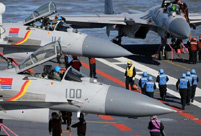


TEHRAN, Jan. 24 -- Chinese President Xi Jinping on Saturday concluded a two-day state visit to Iran, the last leg of his three-nation visit to the Middle East to upgrade ties and boost cooperation.
Xi discussed cooperation with leaders of Saudi Arabia, Egypt and Iran within the framework of the Belt and Road Initiative and unveiled cooperation projects in fields including industrial capacity, infrastructure and energy.
During Xi's trip, China upgraded its diplomatic relations with Saudi Arabia and Iran respectively to comprehensive strategic partnership, a positioning which means closer cooperation in various areas.
Xi tried to promote enhanced dialogue as a means of resolving differences in the Middle East, and unveiled new aid programs to facilitate development, which he said is key to overcoming difficulties.
Meanwhile, the Chinese leader made it clear that his country is not looking for proxies or trying to fill any "vacuum" in the Middle East, but aspiring to build "a network of mutually beneficial partnerships."
LIFTING BILATERAL TIES WITH IRAN
While in Tehran, Xi agreed with Iranian President Hassan Rouhani to elevate the bilateral ties to a comprehensive strategic partnership.
"China stands ready to work with Iran to lift our mutually-beneficial cooperation in such fields as politics, economy and trade, energy, infrastructure, security, and cultural and people-to-people exchanges to a new stage," the president said.
Rouhani said Iran will respond actively to the Belt and Road Initiative, a vision Xi put forward in 2013 to boost interconnectivity and common development along the ancient land and maritime Silk Roads.
The two sides signed a Memorandum of Understanding on jointly pursuing the initiative.
The Chinese president highlighted a few priorities in the practical cooperation with Iran within the framework of the Belt and Road Initiative such as energy, interconnectivity, industrial capacity and finance.
China hopes the Iran nuclear deal, the Joint Comprehensive Plan of Action (JCPOA), can be implemented smoothly, Xi said.
China and Iran agreed to set up an annual meeting mechanism between their foreign ministers. They also said that China supports Iran's application for full membership of the Shanghai Cooperation Organization (SCO).
Xi also met with Supreme Leader Ayatollah Ali Khamenei and Parliament Speaker Ali Larijani.
Khamenei said that Tehran is willing to push the bilateral practical cooperation to a new high. Iran is an important country along the Belt and Road and stands ready to play a greater role in jointly pursuing the initiative with China, the supreme leader said.
PROMOTING DEVELOPMENT IN MIDDLE EAST
Xi's visit to Egypt, the second leg of his regional tour, is the first by a Chinese head of state in 12 years. The two sides are celebrating the 60th anniversary of the establishment of their diplomatic ties.
During Xi's visit, the two sides signed a five-year outline document to further advance their relationship.
According to the 18-page document, they will boost their cooperation in such fields as politics, trade and economy as well as military and security.
"China will continue to view and develop its relations with Egypt from a strategic and long-term perspective," Xi said in a signed article published on local newspaper prior to his arrival.
He proposed that the two countries work together to build the Arab nation into a pivot of the Belt and Road. To that end, Xi suggested, China and Egypt should align their development strategies and visions and focus on cooperation on infrastructure construction and industrial capacity.
Xi said China is willing to participate in Egypt's key projects including the development of the Suez Canal Corridor and the construction of a new administrative capital.
Xi also invited his Egyptian counterpart Abdel-Fattah al-Sisi to attend the Group of 20 (G20) summit in the Chinese city of Hangzhou in September.
While in Egypt, Xi delivered an important speech at the headquarters of the Arab League outlining Chinese approach to issues in the Middle East.
The Chinese leader said that the key to resolving differences in the Middle East is to enhance dialogue and that the key to overcoming difficulties in the region is to promote development.
He said that the Chinese government has decided to pledge 50 million RMB (7.53 million U.S. dollars) to help improve the livelihood of the Palestinians and 230 million RMB (about 35 million dollars) for Syria, Jordan, Lebanon, Libya and Yemen as humanitarian assistance.
Xi announced loan programs in support of development in the Middle East, including 15 billion dollars of exclusive loans, 10 billion dollars of commercial lending and 10 billion dollars of concessional loans, as well as joint investment funds worth a total of 20 billion dollars.
Xi said China is not trying to fill any "vacuum" in the Middle East.
"Instead of looking for proxies, China promotes peace talks in the Middle East; instead of seeking any sphere of influence, China calls on all nations in the region to take part in the Belt and Road Initiative; and instead of attempting to fill any 'vacuum', China aspires to build a network of mutually beneficial partnerships," he said.
ENHANCING ENERGY COOPERATION WITH SAUDI
The first leg of Xi's Middle East tour took him to Saudi Arabia, where he met with King Salman bin Abdulaziz Al Saud on Tuesday.
The two leaders agreed to upgrade the bilateral ties to a comprehensive strategic partnership.
Xi said, "I believe it will deepen the mutual strategic trust, lead to greater achievements in our mutually beneficial cooperation, and help facilitate and broaden our shared interests in international and regional affairs."
During his stay in Riyadh, the two sides signed a memorandum of understanding on industrial capacity cooperation, agreeing to pursue cooperation under the Belt and Road Initiative.
The two countries also signed a slew of cooperation deals covering such sectors as energy, communications, environment, culture, aerospace, and science and technology.
"I believe it will deepen the mutual strategic trust, lead to greater achievements in our mutually beneficial cooperation, and help facilitate and broaden our shared interests in international and regional affairs," Xi said on the upgrade of bilateral ties.
Energy cooperation is a key part of Xi's visit, during which the leaders agreed to build stable long-term energy cooperation. Saudi Arabia is China's biggest foreign supplier of crude oil.
When meeting with the head of the Cooperation Council for the Arab States of the Gulf (GCC), Xi said that China is willing to carry out comprehensive energy cooperation with the GCC countries and be a long-term, stable and reliable energy market for the six-member bloc.
Xi attended the launching ceremony of the Yasref oil refinery, a joint venture with a total investment of nearly 10 billion U.S. dollars. Chinese oil giant Sinopec holds a 37.5 percent stake in it.
The launch of the refinery conforms to not only Saudi national development plan, but also China's pursuit of cooperation with countries in the regions outlined in the Belt and Road Initiative, Xi said.
During Xi's visit, China and the GCC announced that they are committed to working closely to conclude a comprehensive free trade agreement (FTA) within 2016.
 A foreign girl explains what China should be proud of
A foreign girl explains what China should be proud of Chinese navy's air-cushioned landing craft in pictures
Chinese navy's air-cushioned landing craft in pictures Chinese pole dancing master opens class in Tianjin
Chinese pole dancing master opens class in Tianjin PLA holds joint air-ground military drill
PLA holds joint air-ground military drill Charming female soldiers on Xisha Islands
Charming female soldiers on Xisha Islands Beautiful skiers wear shorts in snow
Beautiful skiers wear shorts in snow Getting close to the crew on China's aircraft carrier
Getting close to the crew on China's aircraft carrier Chinese stewardess celebrate test flight at Nansha Islands
Chinese stewardess celebrate test flight at Nansha Islands Pentagonal Mart becomes the largest vacant building in Shanghai
Pentagonal Mart becomes the largest vacant building in Shanghai Top 20 hottest women in the world in 2014
Top 20 hottest women in the world in 2014 Top 10 hardest languages to learn
Top 10 hardest languages to learn 10 Chinese female stars with most beautiful faces
10 Chinese female stars with most beautiful faces China’s Top 10 Unique Bridges, Highways and Roads
China’s Top 10 Unique Bridges, Highways and Roads Virtual reality takes porn ‘to the next level’
Virtual reality takes porn ‘to the next level’ Online spat won’t hinder cross-Straits ties
Online spat won’t hinder cross-Straits ties A look behind the scenes at China’s censorship watchdog
A look behind the scenes at China’s censorship watchdog $93m gay app deal raises questions over future of LGBT services
$93m gay app deal raises questions over future of LGBT servicesDay|Week